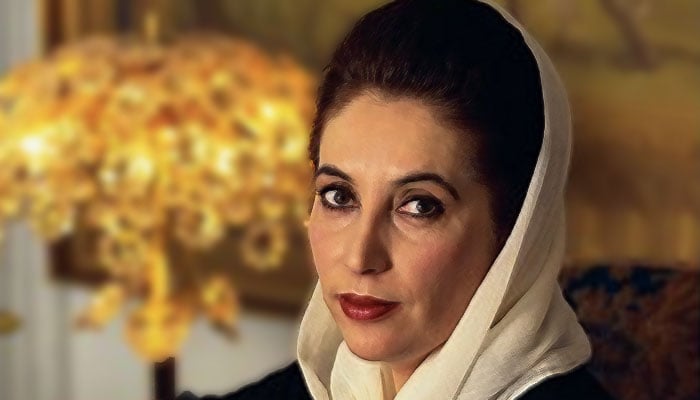My first and last interview with Benazir Bhutto
I wish my interview with her had been about her. Her plans for her country. Her plans for her children. Her plans for Bilawal.
January 22, 2018

My first meeting with Benazir Bhutto was in Dubai, where she was living with her children while her husband was incarcerated in Pakistan. The interview was arranged for my program, 50 Minutes. The topic was the fall of Dhaka.
She arrived half an hour late. Her forehead was beaded with sweat. We had only 20 minutes to rush through the interview as Bibi had to leave for another meeting. With the air conditioner blaring behind us, we began.
“Why did Zulfiqar Ali Bhutto use the slogan ‘udhar tum, idhar hum’? I asked.
She was instantly perturbed. “It did not mean to suggest that we are separated. It meant that you have been elected there [East Pakistan], which is where you shall govern, and we have been elected here [West Pakistan],” she replied.
Without waiting for a follow-up question, she continued: “Listen, people who object to my father’s role need to examine the first speech Sheikh Mujibur Rahman made when he was released and reached Dhaka. He said that all his life he had fought for an independent country.”
“Was there a distant possibility that had Bhutto and Rehman sat together, a constitution that they both agreed on could have been worked out?”
She didn’t share my optimism or my naivety. “General Yahya Khan set a 120-day limit,” she added, “the limit didn’t mean much. He intended to dissolve the assembly one way or another.”
Our back and forth continued as tea was served. The spread before us was scrumptious. Bibi cancelled her engagements scheduled for later that day and asked me to join her for dinner. As we sipped our tea, she opened a box of chocolates – her weakness. “I want to lose weight, but I can’t,” she said gesturing to the box.
Soon we were back in 1971. I asked her to recount the day her father stormed out of the United Nations, after tearing up the Polish Resolution that provided, amongst other things, for a direct transfer of power from Islamabad to Dhaka.
“No that is incorrect,” she interjected, “I was seated at the table that day. He tore up his own notes, not the Resolution. He told the members that his people were dying, they are being separated at gunpoint and this gathering is wasting his time.”
While at Oxford, Benazir Bhutto attended a rally in favour of the Pakistan Army. I probed her about it. “I admit I did not have a deep understanding of the sensitive matters then. It was only when I became the prime minister that I realized how the establishment interferes in politics.”
Outside, the sky was turning a charcoal grey. Bibi went out of the room and brought in her children. She then kicked off her shoes and sat crossed legged on the sofa. “Let's chat now,” she told me, before turning to a young Bilawal, “And I want you to listen carefully.”
We spoke a little more about the fall of Dhaka when our conversation was interrupted again. An American senator wanted Bibi on the phone. When she returned, I asked her about it. The senator, she told me, was insisting that she return to Pakistan. General Pervez Musharraf’s commanders had assured him of her safety. But Bibi was reluctant. Her prime concern was her children. With Zardari still in jail, what would they do if she too is thrown behind bars?
As I walked out, I kept thinking about her. She had witnessed so much of history by her father’s side. Now, as a mother, it seemed she wanted to protect her children but she also wanted them to be prepared. I met her a couple of more times in Dubai before she left for Pakistan. Each time, she seemed wiser and sagacious. I wish my last interview with her had been about her, and not just about 1971. Her plans for her country. Her plans for her children. Her plans for young Bilawal, who could have learned so much from his mother, had she lived.











